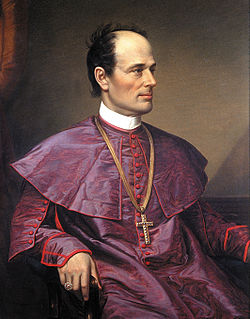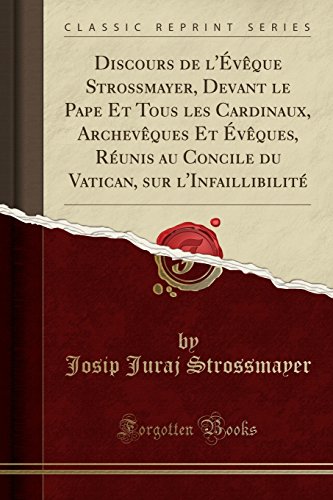Background
Strossmayer was born in Osijek, on the 4th of February 1815. His great-grandfather was an ethnic German immigrant from Styria who had married a Croatian woman.



(Excerpt from Discours de l'Évêque Strossmayer, Devant le ...)
Excerpt from Discours de l'Évêque Strossmayer, Devant le Pape Et Tous les Cardinaux, Archevêques Et Évêques, Réunis au Concile du Vatican, sur l'Infaillibilité Quand Jésus - Christ envoya les Apôtres à la conquête du monde, il leur confère. À tous également le pouvoir de lier et de délier; il leur donna à tous également le pouvoir du Saint - Esprit. Permettez - moi de le répéter: s'il avait voulu constituer Pierre 8011 vicaire, il lui eût donné, en _termes précis, le commandement sur son armée spirituelle. About the Publisher Forgotten Books publishes hundreds of thousands of rare and classic books. Find more at www.forgottenbooks.com This book is a reproduction of an important historical work. Forgotten Books uses state-of-the-art technology to digitally reconstruct the work, preserving the original format whilst repairing imperfections present in the aged copy. In rare cases, an imperfection in the original, such as a blemish or missing page, may be replicated in our edition. We do, however, repair the vast majority of imperfections successfully; any imperfections that remain are intentionally left to preserve the state of such historical works.
http://www.amazon.com/gp/product/1334852588/?tag=2022091-20
bishop clergyman politician statesman
Strossmayer was born in Osijek, on the 4th of February 1815. His great-grandfather was an ethnic German immigrant from Styria who had married a Croatian woman.
He finished a gymnasium in Osijek, graduated theology at the Catholic seminary in Đakovo, and earned a PhD in philosophy at a high seminary in Budapest, at the age of 20
In 1838 he took holy orders, and during the next ten years became lecturer on theology at Djakovo, chaplain to the Austrian emperor, and director of the Augustinian body at Rome. In 1849 he was consecrated bishop of Djakovo, with the official title "Bishop of Bosnia, Slavonia and Sirmium. " He fostered the growth of Slavonic nationalism in Croatia-Slavonia, in Dalmatia, and among the Slovenes of south Austria, aiding the Ban Jellacic in his campaigns against Hungary (1848 - 49), and subsequently becoming a recognized leader of the opposition to Hungarian predominance. Besides being foremost among the founders of the South Slavonic Academy in 1867, and of Agram University in 1874, he helped to reorganize the whole educational system of Dalmatia and Croatia-Slavonia. He built a palace and cathedral at Djakovo, founded a seminary for the Bosnian Croats, presented the South Slavonic Academy with a gallery of valuable pictures, and published collections of national songs and tales. He also aided Augustin Theiner, then librarian at the Vatican, to compile his Vetera monumenta Slavorum meridionalium historiam illustrantia (Rome, 1863).
Strossmayer withdrew from political life in 1888, in consequence of a rebuke administered to him by the emperor for his public expression of sympathy with Russia and his consistent hostility to Hungary. He died in his ninety-first year, on the 10th of April 1905.
He was a count of the Holy Roman Empire, a bishop of the pontifical throne, and a member of the theological faculties of Budapest and Vienna. By Leo XIII he was decorated with the archiepiscopal pallium.
Strossmayer is credited with monetary and organizational support for a wide variety of public works in Croatia: schools, gymnasiums, public libraries, helping the poor in remote areas, even building roads, and donating building material for St. Peter's Basilica in the Vatican.
The university of the city of Osijek is named after him, and a large statue of Strossmayer is located in the park that the Academy building overlooks. The city of Đakovo built him a memorial museum in 1991. One of the main streets in Sarajevo carries his name. A monument in the Sofia district of Ilinden commemorates Strossmayer's contribution to Bulgarian culture. Also, an important square in Prague is named after him.
(Excerpt from Discours de l'Évêque Strossmayer, Devant le ...)
As a theologian, Strossmayer became prominent by his energetic opposition to the dogma of infallibility at the Vatican council of 1870, and by his denunciation of the Jesuits, while they in return charged him with allowing Roman Catholics to adopt the orthodox Greek confession. For years he refused to accept the doctrine of infallibility, but ultimately he yielded. Despite this attitude, he enjoyed the confidence of Pope Leo XIII. He headed the Slavonic deputations which visited Rome in 1881 and 1888, and won for them the retention of a Slavonic liturgy by the Roman Catholics of Illyria.
In 1860 he became the leader of the People's Party and remained at its head until 1873. In 1872 the Parliament formed a regnikolar deputation for the revision of the Settlement, and Strossmayer was its member, but they again failed in their task. This made Strossmayer retire from active political life and from the leadership of the People's Party. He later sided with the Independent People's Party which was in the opposition and which protested the rule of ban Khuen Hedervary (1883–1903), and insisted on the merger of all Croatian lands under the Kingdom of Hungary.
